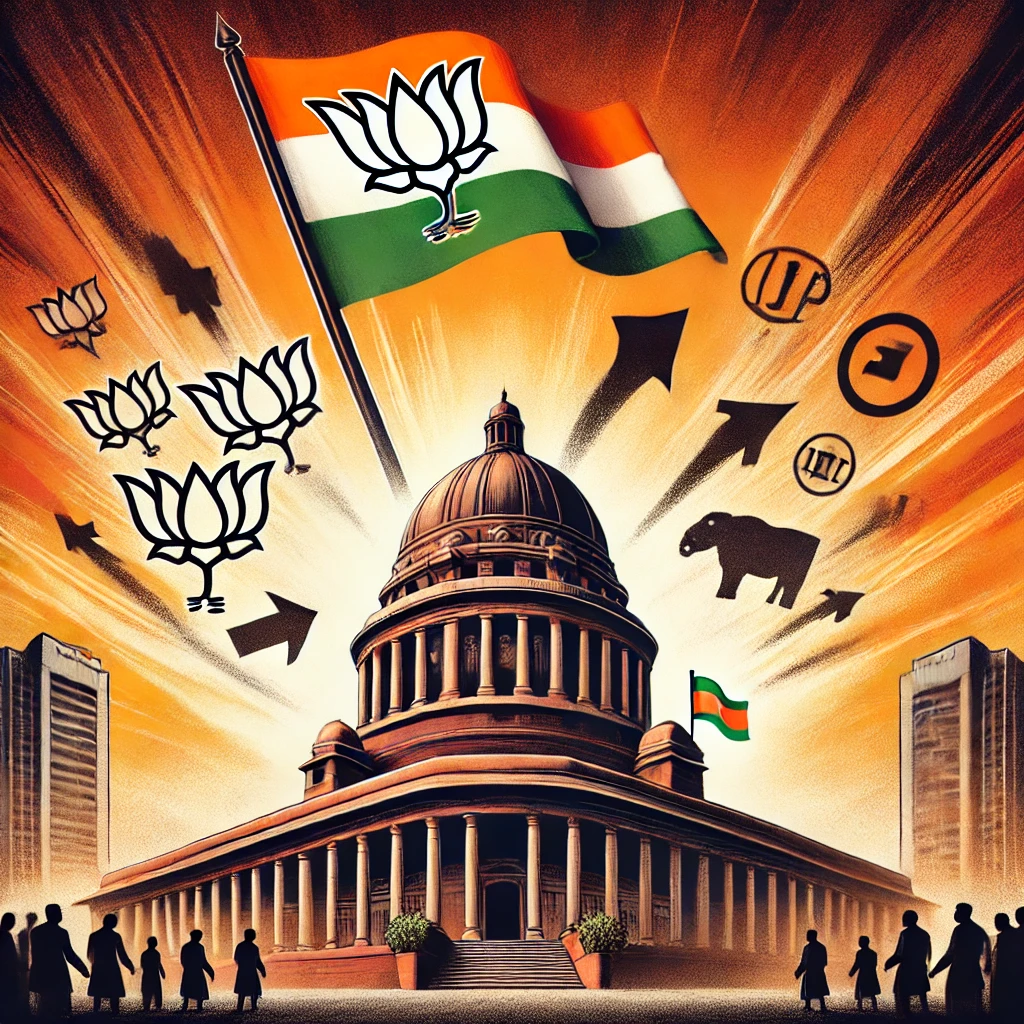The Changing Landscape of Indian Politics: BJP’s Consolidation and Opposition’s Challenges
Politics Politics of IndiaPosted by NewAdmin on 2025-03-07 09:05:25 |
Share: Facebook | Twitter | Whatsapp | Linkedin Visits: 70

Indian politics has undergone a significant transformation over the last decade, with the Bharatiya Janata Party (BJP) emerging as the dominant force. The party, under the leadership of Prime Minister Narendra Modi, has established itself as the central pillar of Indian politics, while the opposition parties, particularly the Indian National Congress, continue to struggle for relevance. This article delves into the factors contributing to the BJP’s dominance and the challenges faced by the opposition in reviving their political influence.
BJP’s Rise to Power
The BJP's rise to political supremacy is a result of strategic planning, effective leadership, and an understanding of grassroots politics. The 2014 general elections marked a turning point when Narendra Modi led the party to a historic victory, securing an absolute majority in the Lok Sabha. The party’s emphasis on nationalism, economic reforms, and a strong leadership narrative resonated with voters.
One of the major reasons behind the BJP’s success is its ability to connect with people through an efficient election campaign. With the help of social media, targeted messaging, and the mobilization of its organizational structure, the party has managed to maintain a strong grip on Indian politics.
Policy and Governance as a Tool for Political Strength
The BJP has strategically used policies and governance to cement its dominance. Initiatives like Digital India, Make in India, GST implementation, and the abrogation of Article 370 have reinforced the party’s image as a reformist government. The party’s ability to implement welfare schemes like PM Kisan Yojana, Ujjwala Yojana, and Ayushman Bharat has further strengthened its support among rural and middle-class voters.
In contrast, the opposition has struggled to offer a compelling alternative. The Congress, once the dominant force in Indian politics, has faced leadership crises and internal conflicts, making it difficult to counter the BJP’s aggressive political strategies.
Opposition’s Decline and Fragmentation
The decline of the Congress party has been a crucial factor in the BJP’s political dominance. The party has been unable to regain its traditional voter base due to a lack of strong leadership and an unclear vision for the future. Rahul Gandhi’s leadership has often been questioned, and the party has faced significant electoral setbacks in multiple state elections.
Regional parties, on the other hand, have attempted to challenge the BJP, but their influence remains limited to specific states. While leaders like Mamata Banerjee, Arvind Kejriwal, and K. Chandrashekar Rao have tried to position themselves as alternatives to the BJP, a fragmented opposition has made it easier for the ruling party to maintain its stronghold at the national level.
The Hindutva Factor and BJP’s Mass Appeal
A key aspect of the BJP’s dominance is its promotion of Hindutva politics. By positioning itself as the protector of Hindu identity, the party has managed to consolidate a significant vote base. Issues like the Ram Temple in Ayodhya, CAA-NRC, and uniform civil code have further strengthened its appeal among right-wing voters.
The opposition, on the other hand, has struggled to counter the BJP’s narrative. Accusations of appeasement politics and a failure to present a strong ideological alternative have weakened their ability to challenge the ruling party effectively.
Future Prospects: Can the Opposition Make a Comeback?
For the opposition to challenge the BJP’s dominance, it must undergo significant restructuring. The Congress needs a decisive leadership change and a well-defined political strategy. Regional parties need to forge stronger alliances and present a united front against the ruling party.
Efforts like the INDIA alliance, which aims to bring together anti-BJP forces, are steps in the right direction. However, internal conflicts and ideological differences continue to hinder its effectiveness. To counter the BJP’s well-oiled election machinery, the opposition must focus on grassroots mobilization, strong leadership, and a clear vision for governance.
The dominance of the BJP in Indian politics is a result of its strong leadership, strategic policies, and ideological positioning. While the opposition continues to struggle, a political comeback is not impossible. A united opposition, a clear narrative, and a focus on governance can help restore balance in Indian democracy. The upcoming elections will determine whether the BJP continues its dominance or if the opposition can finally reclaim lost ground.
Search
Categories
Recent News
- India's AI Wearables Revolution: Sarvam Kaze Unveiled
- Tennis Star Coco Gauff's Powerful Plea for Change
- Assembly's Solemn Tribute to Political Stalwarts
- NVIDIA's Global Business Guardian: Unveiling Jay Puri's Impact
- Aviation Expert Claims India's Nuclear Strike Plan on Pakistan
- Precious Metals Surge: Gold and Silver Prices Soar
- Swiss Commentator's On-Air Rebuke: When Sports and Politics Collide
- Mizoram's Billion-Rupee Drug Bust: A Year of Unprecedented Seizures